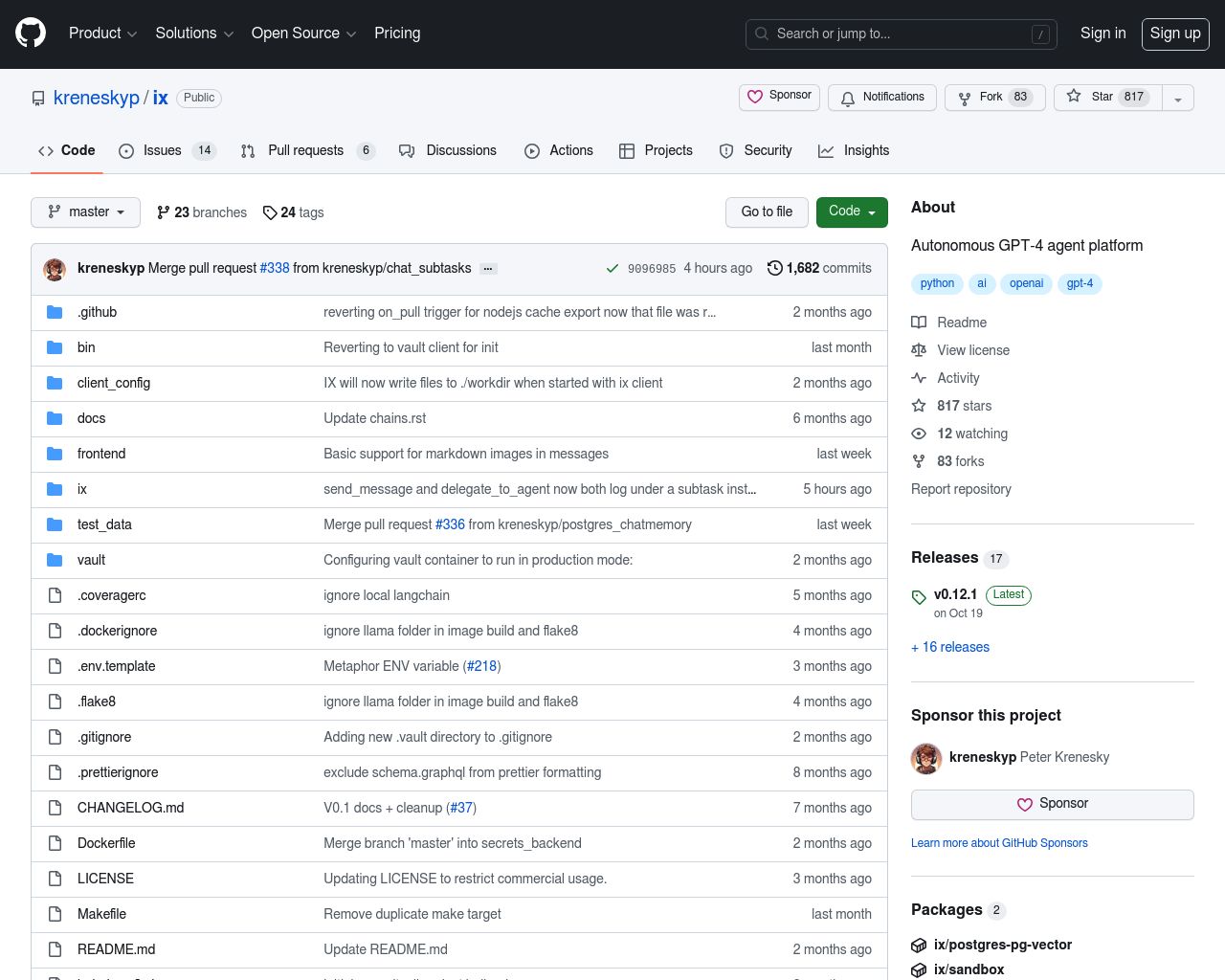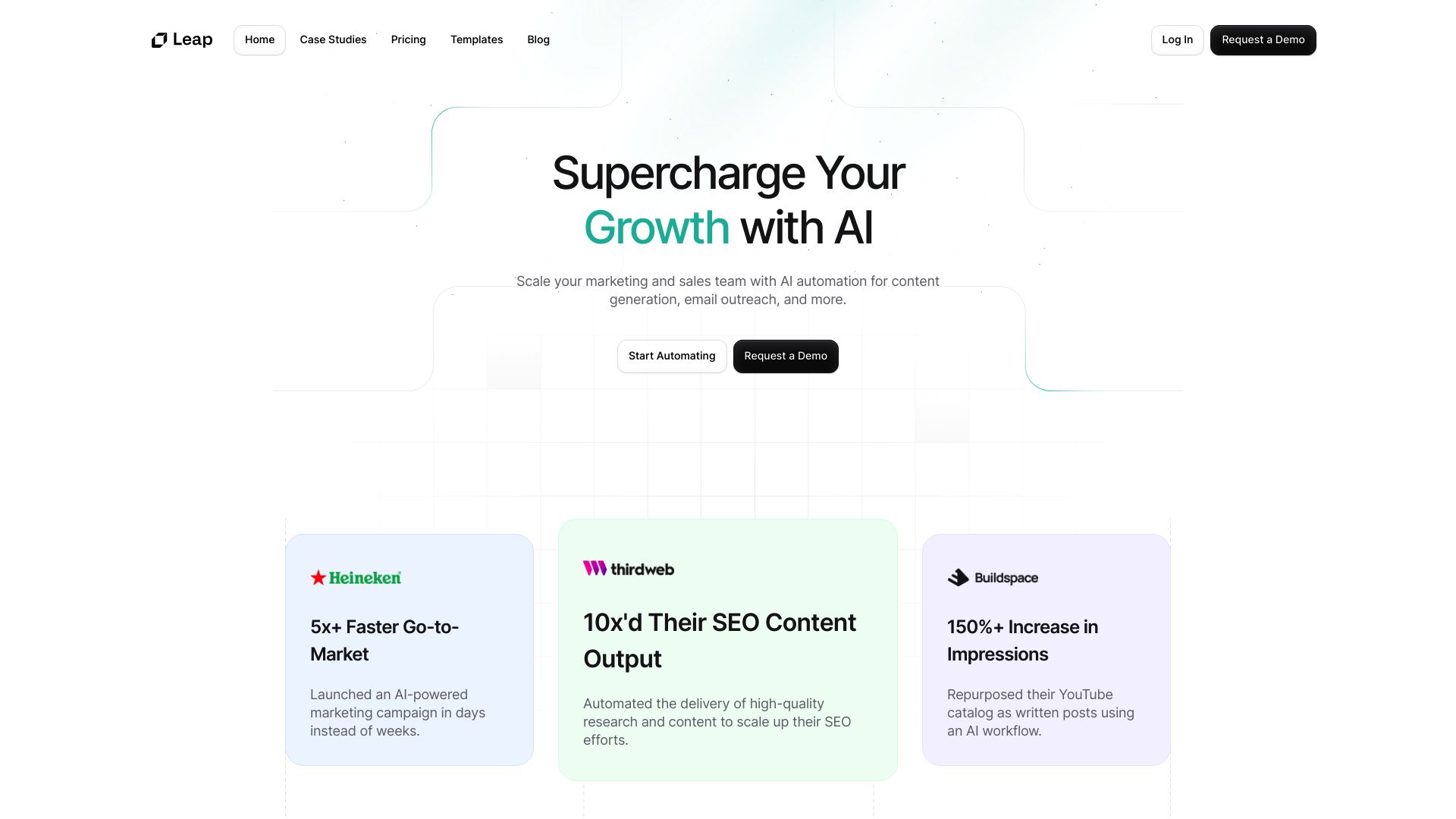Agent iX vs. Leap AI: Comparing AI Development Platforms
The AI agent development landscape offers powerful tools for businesses and developers seeking to harness machine learning capabilities. This review compares Agent iX vs. Leap AI, two platforms revolutionizing AI integration across industries. We’ll examine their unique approaches to agent creation, collaboration features, and user interfaces.
By exploring their strengths and limitations, we aim to help you determine which solution best fits your AI development needs. We’ll also introduce SmythOS, showcasing how it combines the best aspects of both platforms while addressing key limitations. Whether you’re a seasoned developer or new to AI, this comparison will guide you through the evolving world of AI agent platforms.
Agent iX Overview
Agent iX revolutionizes AI development with its open-source platform for creating, hosting, and managing autonomous AI agents. The platform excels in enabling multiple agents to collaborate seamlessly, sharing knowledge and tackling complex tasks in parallel. This unique approach enhances scalability and adaptability across various domains, from web research to code generation.
Agent iX revolutionizes AI development with its open-source platform for creating, hosting, and managing autonomous AI agents. The platform excels in enabling multiple agents to collaborate seamlessly…


Agent iX stands out with its no-code editor, providing an intuitive visual interface for building AI agents. This feature democratizes AI development, allowing users with minimal coding experience to create sophisticated agents through a drag-and-drop interface. The visual representation of agent workflows enhances transparency and facilitates rapid testing and debugging.
Agent iX stands out with its no-code editor, providing an intuitive visual interface for building AI agents. This feature democratizes AI development, allowing users with minimal coding experience…
The platform supports a wide range of AI models, including OpenAI, Google PaLM, Anthropic, and Llama, offering flexibility in choosing the best foundation for specific tasks. Agent iX integrates seamlessly with various APIs, enabling diverse use cases from automating business processes to enhancing customer interactions.
While Agent iX offers impressive capabilities, it lacks some advanced features like multimodal support, data lake integration, and comprehensive audit logs for analytics. The platform’s focus on semi-autonomous agents and collaborative AI environments makes it particularly suitable for developers and businesses seeking to leverage AI for complex problem-solving and task automation.
Leap AI Overview
Leap AI empowers users to create sophisticated AI workflows without coding expertise. The platform’s drag-and-drop interface enables rapid development of AI-powered applications for tasks ranging from content generation to data analysis.


Leap AI’s comprehensive SDK support facilitates seamless integration across various applications. Developers can leverage RESTful API, TypeScript, and Python SDKs to incorporate Leap AI’s capabilities into their projects. The platform’s extensive template library accelerates development, offering pre-built solutions for common use cases like blog post generation and lead summarization.
Leap AI’s comprehensive SDK support facilitates seamless integration across various applications. Developers can leverage RESTful API, TypeScript, and Python SDKs to incorporate Leap AI’s capabilities into their projects.
The software supports a diverse array of AI models, including OpenAI GPT, Mistral 7b, Claude 3 Opus, and Stable Diffusion XL. This variety enables users to tackle a wide range of AI tasks, from text generation to image creation and music composition. Leap AI’s integration capabilities extend its functionality, allowing smooth connections with popular tools like Slack, Hubspot, Zendesk, and Microsoft Power Platform.
While Leap AI offers powerful features, users should consider potential limitations. The platform’s focus on no-code solutions may restrict advanced customization options for highly specialized use cases. Additionally, as with many AI platforms, users must carefully manage data privacy and security concerns, especially when handling sensitive information.
Leap AI positions itself as a versatile solution for businesses and individuals seeking to harness AI’s potential without extensive technical knowledge. Its user-friendly interface and diverse model support make it an attractive option for those looking to rapidly prototype and deploy AI-powered applications across various domains.
Feature Comparison
Agent iX and Leap AI offer distinct approaches to AI agent development, with key differences in their core components and security features. Agent iX excels in multi-agent collaboration, allowing multiple AI agents to work together seamlessly on complex tasks. This capability enables knowledge sharing and parallel processing, enhancing overall efficiency. In contrast, Leap AI focuses more on individual agent performance and ease of use, particularly for non-technical users.
Regarding core components, Agent iX provides a robust no-code editor with a visual interface for creating agent workflows. This feature democratizes AI development, allowing users with minimal coding experience to build sophisticated agents. Leap AI also offers a user-friendly interface but places greater emphasis on pre-built templates and integrations with popular business tools, streamlining the process of deploying AI solutions for common use cases.
In terms of security, neither platform explicitly mentions advanced features like constrained alignment or comprehensive data encryption. However, Agent iX’s open-source nature allows for greater transparency and customization of security measures, potentially giving it an edge for users with specific security requirements. Leap AI, being a commercial platform, likely implements standard security protocols, but the extent of these measures is not fully detailed in the available information.
| Agent iX | Leap AI | SmythOS | |
|---|---|---|---|
| CORE FEATURES | |||
| Hosted Agents (Dev, Production) | ❌ | ❌ | ✅ |
| Environments (Dev, Production) | ❌ | ✅ | ✅ |
| Memory & Context | ❌ | ✅ | ✅ |
| Autonomous Agents | ❌ | ❌ | ✅ |
| Explainability & Transparency | ❌ | ❌ | ✅ |
| Debug Tools | ❌ | ❌ | ✅ |
| Multimodal | ❌ | ✅ | ✅ |
| Multi-Agent Collaboration | ✅ | ❌ | ✅ |
| Audit Logs for Analytics | ❌ | ✅ | ✅ |
| Work as Team | ❌ | ✅ | ✅ |
| SECURITY | |||
| Constrained Alignment | ✅ | ❌ | ✅ |
| Data Encryption | ❌ | ✅ | ✅ |
| OAuth | ❌ | ✅ | ✅ |
| IP Control | ❌ | ✅ | ✅ |
| COMPONENTS | |||
| Huggingface AIs | ❌ | ✅ | ✅ |
| Zapier APIs | ❌ | ✅ | ✅ |
| Classifiers | ❌ | ✅ | ✅ |
| Data Lakes | ❌ | ❌ | ✅ |
| DEPLOYMENT OPTIONS (EMBODIMENTS) | |||
| Deploy as API | ❌ | ✅ | ✅ |
| Deploy as Webhook | ❌ | ✅ | ✅ |
| Staging Domains | ❌ | ✅ | ✅ |
| Production Domains | ❌ | ✅ | ✅ |
| API Authentication (OAuth + Key) | ❌ | ✅ | ✅ |
| Deploy as Site Chat | ❌ | ✅ | ✅ |
| Deploy as Scheduled Agent | ❌ | ✅ | ✅ |
| Deploy as GPT | ❌ | ✅ | ✅ |
| DATA LAKE SUPPORT | |||
| Hosted Vector Database | ❌ | ❌ | ✅ |
| Sitemap Crawler | ❌ | ✅ | ✅ |
| YouTube Transcript Crawler | ❌ | ✅ | ✅ |
| URL Crawler | ❌ | ✅ | ✅ |
| PDF Support | ❌ | ✅ | ✅ |
| Word File Support | ❌ | ✅ | ✅ |
| TXT File Support | ❌ | ✅ | ✅ |
Best Alternative to Agent iX and Leap AI
SmythOS emerges as the superior alternative to Agent iX and Leap AI for agentic AI automation. We offer a comprehensive platform that combines ease of use with powerful features, positioning SmythOS as the go-to solution for businesses and developers seeking advanced AI capabilities.
Our drag-and-drop interface simplifies the creation of complex AI workflows, allowing users to build sophisticated agents without extensive coding knowledge. This visual approach democratizes AI development, making it accessible to a wider audience while still providing the depth and flexibility needed by experienced developers.
SmythOS excels in its extensive feature set, offering capabilities that outpace both Agent iX and Leap AI… providing robust support for multi-agent collaboration, enabling teams of AI agents to work together on complex tasks.
SmythOS excels in its extensive feature set, offering capabilities that outpace both Agent iX and Leap AI. We provide robust support for multi-agent collaboration, enabling teams of AI agents to work together on complex tasks. This feature significantly enhances productivity and allows for more sophisticated problem-solving than what’s possible with individual agents.
Additionally, our platform includes advanced debugging tools, explainability features, and comprehensive audit logs, ensuring transparency and ease of optimization throughout the development process.
Unlike Agent iX and Leap AI, SmythOS offers unparalleled flexibility in deployment options. We support a wide range of embodiments, including APIs, webhooks, chatbots, and scheduled agents. This versatility allows users to integrate AI seamlessly into existing systems and workflows, regardless of the specific requirements or constraints of their projects. Furthermore, our platform provides robust scalability features, ensuring that AI solutions can grow alongside business needs without compromising performance or reliability.
By choosing SmythOS, users gain access to a cutting-edge AI platform that combines user-friendliness with advanced capabilities. Our commitment to innovation, coupled with our comprehensive feature set and flexible deployment options, makes SmythOS the ideal choice for organizations looking to harness the full potential of AI technology.
Whether you’re building customer service chatbots, automating complex business processes, or developing innovative AI applications, SmythOS provides the tools and support needed to bring your vision to life efficiently and effectively.
Conclusion
Agent iX and Leap AI offer powerful AI development platforms, each with unique strengths. Agent iX excels in multi-agent collaboration and provides an intuitive no-code editor, making it ideal for complex problem-solving scenarios. Leap AI shines with its extensive template library and diverse AI model support, catering to users seeking rapid AI application development.
While both platforms have their merits, SmythOS emerges as the superior choice for businesses and developers looking to harness the full potential of AI. Our platform combines the best of both worlds, offering a user-friendly drag-and-drop interface alongside advanced features like multimodal support, data lake integration, and comprehensive audit logs. SmythOS’s ’Create Once, Deploy Anywhere’ approach ensures unparalleled flexibility, allowing users to seamlessly integrate AI agents across various platforms and services.
SmythOS stands out with its extensive integration ecosystem, supporting over 300,000 integrations and a wide range of AI models. This versatility, coupled with our robust security measures and scalable architecture, makes SmythOS the ideal solution for businesses of all sizes looking to innovate and automate their processes. Explore our diverse range of AI-powered agent templates to jumpstart your AI journey and create a free SmythOS account to experience the future of AI development firsthand.
Last updated:
Disclaimer: The information presented in this article is for general informational purposes only and is provided as is. While we strive to keep the content up-to-date and accurate, we make no representations or warranties of any kind, express or implied, about the completeness, accuracy, reliability, suitability, or availability of the information contained in this article.
Any reliance you place on such information is strictly at your own risk. We reserve the right to make additions, deletions, or modifications to the contents of this article at any time without prior notice.
In no event will we be liable for any loss or damage including without limitation, indirect or consequential loss or damage, or any loss or damage whatsoever arising from loss of data, profits, or any other loss not specified herein arising out of, or in connection with, the use of this article.
Despite our best efforts, this article may contain oversights, errors, or omissions. If you notice any inaccuracies or have concerns about the content, please report them through our content feedback form. Your input helps us maintain the quality and reliability of our information.
